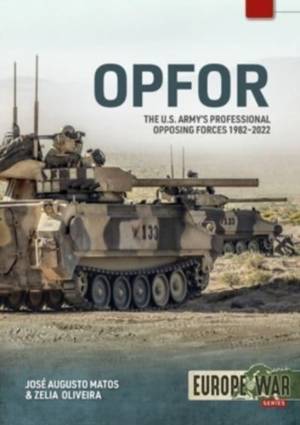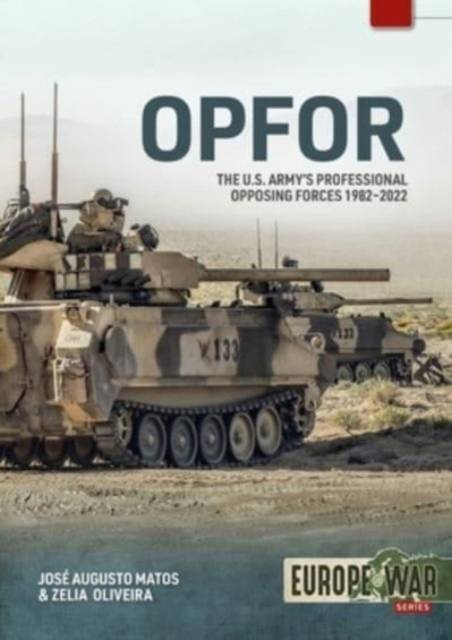
- Afhalen na 1 uur in een winkel met voorraad
- Gratis thuislevering in België vanaf € 30
- Ruim aanbod met 7 miljoen producten
- Afhalen na 1 uur in een winkel met voorraad
- Gratis thuislevering in België vanaf € 30
- Ruim aanbod met 7 miljoen producten
Zoeken
Omschrijving
The U.S. Army's permanent opposing forces can trace their origins to 1946, when the Army stood up the fictional 'Circle Trigonist' aggressor force based loosely on Second World War German and Soviet forces, which gradually morphed into a more Soviet type of opponent for Army exercises as the Cold War progressed. While there were no dedicated aggressor units, the Army established unique doctrine, tactics, uniforms, and even used the Esperanto language to create a common 'enemy' for the entire Army to train against.
It was only after the Vietnam War that the Army established a lasting, dedicated opposing force to ensure the Army trained as it expected to fight in the next war. First established at the National Training Center (NTC) in California's Death Valley in 1982, the professional OPFOR now comprises:
- The 11th Armored Cavalry Regiment at NTC is a brigade-sized unit that can replicate a low-level urban insurgency or an entire Soviet-style armored division;
- The 1st Battalion, 509th Airborne Infantry at the Joint Readiness Training Center (JRTC) Louisiana that specializes in replicating low-intensity conflicts for light infantry and special operations forces;
- The 1st Battalion, 4th Infantry, a combined arms unit at the Joint Multinational Readiness Center (JMRC) in Germany that provides an adaptable enemy for U.S. and allied forces to train against in Europe.
Each OPFOR unit has unique uniforms, emblems and vehicles to help it portray an enemy force with some fidelity. Each Combat Training Center provides a unique and challenging environment for the training of visiting U.S. and allied units.
The Army OPFOR provides an aggressive, challenging force with which to test tactics, techniques, readiness and equipment in a simulated combat environment, where units are tracked real-time and lasers are used to determine hits and kills. Observer/controllers provide feedback to the units being trained, helping them to identify and correct shortcomings.
The experiences provided by the OPFOR contributed significantly to the decisive victories in Operation Desert Storm in 1991 and Operation Iraqi Freedom in 2003 and provided a pre-deployment crucible for units deploying to Iraq and Afghanistan's subsequent insurgencies. All three units continue in this role today, adapting to accurately portray terrorists, hybrid semi-state groups, and near-peer state adversaries.
It was only after the Vietnam War that the Army established a lasting, dedicated opposing force to ensure the Army trained as it expected to fight in the next war. First established at the National Training Center (NTC) in California's Death Valley in 1982, the professional OPFOR now comprises:
- The 11th Armored Cavalry Regiment at NTC is a brigade-sized unit that can replicate a low-level urban insurgency or an entire Soviet-style armored division;
- The 1st Battalion, 509th Airborne Infantry at the Joint Readiness Training Center (JRTC) Louisiana that specializes in replicating low-intensity conflicts for light infantry and special operations forces;
- The 1st Battalion, 4th Infantry, a combined arms unit at the Joint Multinational Readiness Center (JMRC) in Germany that provides an adaptable enemy for U.S. and allied forces to train against in Europe.
Each OPFOR unit has unique uniforms, emblems and vehicles to help it portray an enemy force with some fidelity. Each Combat Training Center provides a unique and challenging environment for the training of visiting U.S. and allied units.
The Army OPFOR provides an aggressive, challenging force with which to test tactics, techniques, readiness and equipment in a simulated combat environment, where units are tracked real-time and lasers are used to determine hits and kills. Observer/controllers provide feedback to the units being trained, helping them to identify and correct shortcomings.
The experiences provided by the OPFOR contributed significantly to the decisive victories in Operation Desert Storm in 1991 and Operation Iraqi Freedom in 2003 and provided a pre-deployment crucible for units deploying to Iraq and Afghanistan's subsequent insurgencies. All three units continue in this role today, adapting to accurately portray terrorists, hybrid semi-state groups, and near-peer state adversaries.
Specificaties
Betrokkenen
- Auteur(s):
- Uitgeverij:
Inhoud
- Aantal bladzijden:
- 88
- Taal:
- Engels
- Reeks:
Eigenschappen
- Productcode (EAN):
- 9781804513682
- Verschijningsdatum:
- 31/08/2025
- Uitvoering:
- Paperback
- Formaat:
- Trade paperback (VS)
- Afmetingen:
- 211 mm x 297 mm

Alleen bij Standaard Boekhandel
+ 55 punten op je klantenkaart van Standaard Boekhandel
Beoordelingen
We publiceren alleen reviews die voldoen aan de voorwaarden voor reviews. Bekijk onze voorwaarden voor reviews.











